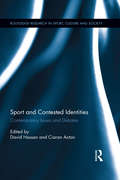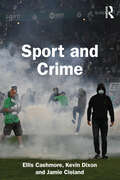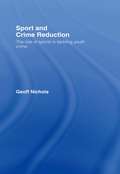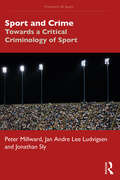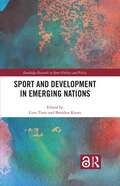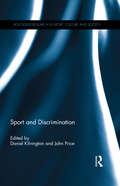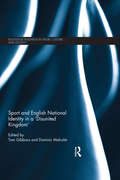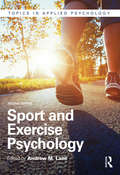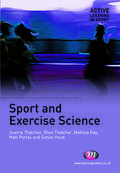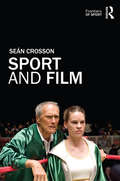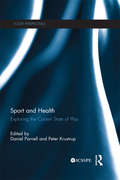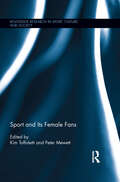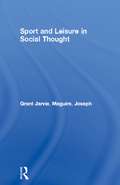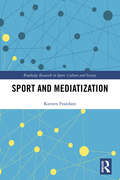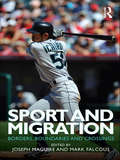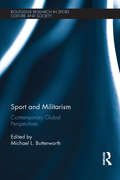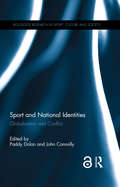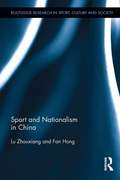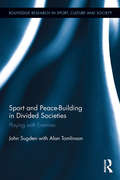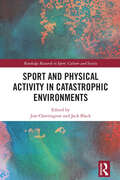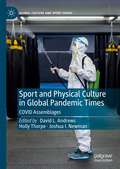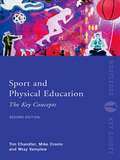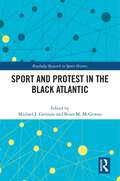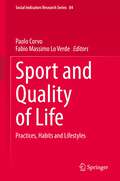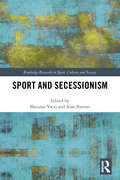- Table View
- List View
Sport and Contested Identities: Contemporary Issues and Debates (Routledge Research in Sport, Culture and Society)
by David Hassan Ciaran ActonIdentity is one of the most theorised and contested of all sociological concepts and sport is fertile ground for an examination of its complexities. This book offers a wide-ranging and up-to-date exploration of the sport-identity nexus, drawing examples from a variety of sporting contexts and geographical locations, and incorporating a diversity of perspectives including players, spectators, officials, the media and policy-makers. Covering key themes in the social scientific study of sport such as gender, ethnicity and national identity, it considers the impact of social, cultural and technological change on the formation of sporting identities. Including original real-life case studies, each chapter makes a unique contribution to our understanding of the complex relationship between sport and identity. As this relationship is embedded within the broader structures of power that frame social inequality, this book also poses important questions about the role of sport-related initiatives in our society today, as well as in years to come. Sport and Contested Identities: Contemporary Issues and Debates is fascinating reading for all students and scholars of the sociology of sport.
Sport and Crime
by Ellis Cashmore Kevin Dixon Jamie ClelandThis comprehensive review of the relationship between sport and crime explains how the experience of sport can lead to behaviour that’s harmful to others and is sometimes self-destructive. It challenges the conventional idea of sport as wholesome and beneficial, arguing that sport is often a trigger for crime, in both history and contemporary life.The book explores how murder, violence, bribery, sexual assault, matchfixing, corporate corruption, crowd disorder, hate crimes, drug offences, alcohol-induced transgressions and cyber-crimes are often caused or accelerated by sport, and it speculates on sports-related crimes of the future. The book’s narrative is driven by hundreds of case studies, and each chapter has summary points. There are also eight descriptive timelines that enable the reader to see at a glance how sport has, over the decades and centuries, been a catalyst for crime.This is an essential text for any course on sport and crime and invaluable reading for anybody with an interest in the sociology of sport, sport history, sports law, sport management, sport development, criminology or cultural studies. Anyone seriously interested in the study of sport will be gripped.
Sport and Crime Reduction: The Role of Sports in Tackling Youth Crime
by Geoff NicholsThe use of sports-based activity programmes as a means of tackling crime has been explored in a number of countries worldwide, particularly in relation to the prevention of re-offending in the ten to eighteen age bracket. However, until now there has been no definitive and rigorous analysis of the rationale behind these programmes, and evidence of their successes and failures has been piecemeal, uncritical and without standardization. This book addresses this gap in the literature, bringing together empirical research from programmes in the UK, US and Australia with an explanation and evaluation of the results of these initiatives. Subjects covered include: assessment of programmes in a range of contexts the first evidence base of crime reduction sport programmes international comparisons and case studies conclusions for best practice advice for monitoring the effectiveness of programmes synergies with sport development and promotion of facility use. Examining a variety of realworld case studies set up with the aim of reducing levels of crime in the community, Sport and Crime Reduction should be read by students and professionals in local government, sports development, youth and community work, criminology, the youth justice system and leisure policy.
Sport and Crime: Towards a Critical Criminology of Sport (Frontiers of Sport)
by Peter Millward Jan Andre Ludvigsen Jonathan SlyThis is the first book to explore fully the connections between sport studies and criminology, opening up critical new frontiers in the study of sport and crime. Rooted firmly in established critical criminological traditions, the book also employs insights from emerging theoretical frameworks such as cultural criminology, governmentality theory and critical security studies to make better sense of a range of transnational and contemporary cases, events and trends that reveal, in different ways, the crimes and harms that are present in sport. Empirically grounded, including case studies of the 2022 World Cup in Qatar and the Tokyo 2020 Olympic Games, it explores emerging themes in contemporary sport, including but not limited to corruption, doping, youth crime, terrorism, violence and transgression, and human rights abuses. Sport and Crime consciously pushes the boundaries of what might be considered the critical criminology of sport. This is an essential text for any course on sport and crime, and invaluable reading for any student or researcher with an interest in the sociology of sport, sport development, sport policy, the politics of sport, critical criminology, or socio-legal studies.
Sport and Development in Emerging Nations (Routledge Research in Sport Politics and Policy)
by Brendon Knott Cem TinazFor the first time, this book examines the strategies of leaders of emerging nations to use sport as a tool for reaching social, economic, cultural, political, technological or environmental goals and gaining international prestige. It assesses whether sport can really be an effective tool in international development. The book explores the unique challenges, issues and opportunities offered by sport for development in emerging nations. Bringing together case studies of sport and development in countries including Brazil, China, Czech Republic, Hungary, India, Indonesia, Mexico, Poland, Qatar, South Africa, South Korea and Turkey, the book looks at policies designed to achieve development through, by and for sport, and whether they have achieved their socio-economic objectives. It considers the way that emerging nations have used major international sports events as political and developmental projects, as well as the importance of sporting infrastructure, professional leagues, participation programmes and the influence of nationalism and ideology.With a truly global perspective, this book is important reading for any student, researcher or policy-maker with interest in sport management, sport development, development studies, international economics, globalisation or political science.
Sport and Discrimination (Routledge Research in Sport, Culture and Society)
by John Price Daniel KilvingtonDespite campaigns to educate and increase awareness, discrimination continues to be a deep-rooted problem in sport. This book provides an international, interdisciplinary and critical discussion of various forms of discrimination in sport today, with contributions from world-leading academics and high-profile campaigners. Divided into five sections, the book explores racism, sexism, homophobia, disability, and the role of media in both perpetuating and tackling discrimination across a variety of sports and sporting events around the world. Drawing on examples from football, rugby, cricket, tennis, climbing, the Olympics and the Paralympics, it offers a critical review of current debates and discusses the latest empirical research on the changing nature of discrimination in sport. Taking into account the experiences of athletes and coaches across all performance levels, it presents recommendations for further action and directions for future research. A timely and challenging study, Sport and Discrimination is essential reading for all students and scholars of sports studies with an interest in the sociology of sport and the relationship between sport, society and the media.
Sport and English National Identity in a 'Disunited Kingdom': A ‘disunited kingdom’ (Routledge Research in Sport, Culture and Society)
by Dominic Malcolm Tom GibbonsGiven sport’s centrality in English society, what role does it play in symbolising contemporary English national identity? This comprehensive study explores the complex set of relationships between sport and what it means to be English in the twenty-first century. The bond between sport and nationalism has long been recognised, but with increasingly vociferous separatist nationalisms threatening the dismantling of the United Kingdom, a closer analysis is timely. Part one addresses key debates regarding English national identity within the specific sporting contexts of association football, cricket, tennis, cycling and rugby. Part two discusses the complex relationship between religion, sport and English national identity as well as the attitudes and experiences of traditionally marginalized groups, including women, minority ethnic groups and disabled people. Part three considers the perspectives of the other UK nations on the link between sport and English national identity. Sport and English National Identity in a 'Disunited Kingdom' is fascinating reading for all those with an interest in the sociology, politics and history of sport, and the study of nations, nationalism and national identity.
Sport and Exercise Psychology (Topics in Applied Psychology)
by Andrew M LaneThe new edition of Sport and Exercise Psychology asks four fundamental questions that get to the heart of this flourishing discipline: What inner states influence what people think, feel, and behave? How can people manage or self-regulate their own inner states? How can sport and exercise psychology professionals help people manage their inner states? Is sport psychology just a placebo effect? Taking an applied perspective that bridges the gap between sport and exercise, the book answers these questions by covering the key topics in the field, including confidence, anxiety, self-regulation, stress and self-esteem. There are also chapters on the role of music in performance, imagery and exercise addiction. Each chapter is written by an expert in that field, and includes a range of features illustrating specific issues, either within the research literature or their practical application. This is a comprehensive and engaging overview of an evolving discipline, and will be essential reading to any student of sport and exercise psychology. It will also be of huge interest to athletes and coaches seeking an accessible understanding of the role of psychology in sport.
Sport and Exercise Science (Active Learning in Sport Series)
by Joanne Thatcher Rhys Thatcher Matthew Portas Simon Hood Mel DayThis text introduces students to the essentials of the major contributing disciplines – biomechanics, physiology and psychology. It provides detailed knowledge and understanding of each subject area combined with explicit advice on how to study effectively, research further and think critically. Case studies clearly relate theory to practice and learning exercises support readers throughout the text.
Sport and Film (Frontiers of Sport)
by Seán CrossonThe sports film has become one of commercial cinema's most recognizable genres. From classic boxing films such as Raging Bull (1980) to soccer-themed box-office successes like Bend it Like Beckham (2002), the sports film stands at the interface of two of our most important cultural forms. This book examines the social, historical and ideological significance of representations of sport in film internationally, an essential guide for all students and enthusiasts of sport, film, media and culture. Sport and Film traces the history of the sports film, from the beginnings of cinema in the 1890s, its consolidation as a distinct fiction genre in the mid 1920s in Hollywood films such as Harold Lloyd’s The Freshman (1925), to its contemporary manifestation in Oscar-winning films such as Million Dollar Baby (2004) and The Fighter (2010). Drawing on an extensive range of films as source material, the book explores key issues in the study of sport, film and wider society, including race, social class, gender and the legacy of 9/11. It also offers an invaluable guide to 'reading' a film, to help students fully engage with their source material. Comprehensive, authoritative and accessible, this book is an important addition to the literature in both film and media studies, sport studies and cultural studies more generally.
Sport and Health: Exploring the Current State of Play (ICSSPE Perspectives)
by Daniel Parnell and Peter KrustrupIt is a common assumption that sport is good for us and that participation in sport embodies public health benefits. With sport being increasingly used to deliver public health interventions worldwide, this book critically examines the rationale and evidence for sport as a public health policy tool. Featuring contributions from the United Kingdom, United States, Europe and Australia, it sheds new light on an emerging field of research which has significant implications for public health across the globe. Each chapter looks at the effectiveness of sport interventions across the lifespan for biological, psychological and social benefits, including those that utilise a settings-based approach to health promotion such as schools and professional sport clubs. Drawing on cutting-edge research which examines policy and practice at community and elite levels, this book addresses key topics such as education, engaging children and young adults, mental health, sport sponsorship and volunteering. Sport and Health: Exploring the Current State of Play is important reading for all students, scholars and policy makers with an interest in the sociology of sport, physical activity and public health.
Sport and Its Female Fans (Routledge Research in Sport, Culture and Society #17)
by Kim Toffoletti Peter MewettWhy do women follow sports? How do they participate from the sidelines and what is the significance of this contribution? What can female fandom tell us about gender relations in sport? This book explores these and related questions by bringing together the varied strands of research being conducted internationally across the social sciences and humanities on this emerging and topical field. While sports spectatorship is a popular and well-respected site of analysis, no book-length, scholarly contribution documents women’s experiences of sports fandom. For this reason, there is an obvious need for a book that offers researchers, students and non-professional readers an authoritative introduction to women’s modes of sport support. Sport and Its Female Fans will be a landmark contribution in the field of sport research and in studies of sports fandom, making an original contribution to the growing, yet under-researched, area of female sports spectators.
Sport and Leisure in Social Thought
by Grant Jarvie Joseph MaguireThis much needed book examines all of the major traditions of social thought to clearly show their influence in our understanding of sport and leisure.
Sport and Mediatization (Routledge Research in Sport, Culture and Society)
by Kirsten FrandsenContemporary society is highly media-saturated, and no sector more so than sport. Drawing on case studies from the Tour de France to fitness apps, this book introduces the concept of ‘mediatization’ and examines how media - historically and currently – are significant drivers for social and cultural change in sport. Utilizing different analytical approaches, case studies illustrate how so-called legacy media have historically been involved in the establishment of the institution of sport and have persistently been heavily involved in structural changes in the same domain. However, digital media currently add significantly to the development of a more complex picture of globalized interdependencies and still growing media presence in all aspects of the everyday lives of both sporting organizations, athletes and audiences/fans. The book seeks to eschew media centrism, acknowledging that changes are not only ’driven’ by media but also related to other macro-social forces of change, such as globalization, commercialization, and individualization. Offering a new analytical framework, Sport and Mediatization enables students and scholars in the transdisciplinary field of media and sports studies to analyze and understand the influence of media in a much more complex environment.
Sport and Migration: Borders, Boundaries and Crossings
by Joseph MaguireFrom Major League Baseball to English soccer’s Premier League, all successful contemporary professional sports leagues include a wide diversity of nationalities and ethnicities within their playing and coaching rosters. The international migration of sporting talent and labor, encouraged and facilitated by the social and economic undercurrents of globalization, mean that world sport is now an important case study for any student or researcher with an interest in international labor flows, economic migration, global demography or the interdependent world economy. In this dazzling collection of papers, leading international sport studies scholars chart the patterns, policies and personal experiences of labour migration within and around sport, and in doing so cast important new light both on the forces shaping modern sport and on the role that sport plays in shaping the world economy and global society. Presenting original case studies of sports from European and African soccer to Japanese baseball to rugby union in New Zealand, the book makes an important contribution to our understanding of a wide range of issues within contemporary social science, such as national identity politics, economic structure and organization, north-south relations, imperial legacies and gender relations. This book is invaluable reading for students and researchers working in sport studies, human geography, economics or international business.
Sport and Militarism: Contemporary global perspectives (Routledge Research in Sport, Culture and Society)
by Michael L. ButterworthThe institutional relationship between sport and the military appears to be intensifying. In the US for example, which faced global criticism for its foreign policy during the "war on terror," militaristic images are commonplace at sporting events. The growing global phenomenon of conflating sport with war calls for closer analysis. This critical, interdisciplinary and international book seeks to identify intersections of sport and militarism as a means to interrogate, interrupt and intervene on behalf of democratic, peaceful politics. Viewing sport as a crucial site in which militarism is made visible and legitimate, the book explores the connections between sport, the military and the state, and their consequent impact on wider culture. Featuring case studies on sports such as association football, baseball and athletics from countries including the US, UK, Germany, Canada, South Africa, Brazil and Japan, each chapter sheds new light on the shifting significance of sport in our society. This book is fascinating reading for all those interested in sport and politics, the sociology of sport, communication studies, the ethics and philosophy of sport, or military sociology.
Sport and National Identities: Globalization and Conflict (Routledge Research in Sport, Culture and Society)
by Paddy Dolan and John ConnollyWhile globalisation has undoubtedly occurred in many social fields, in sport the importance of ‘the nation’ has remained. This book examines the continuing but contested relevance of national identities in sport within the context of globalising forces. Including case studies from around the world, it considers the significance of sport in divided societies, former global empires and aspirational nations within federal states. Each chapter looks at sport not only as a reflection of national rivalries but also as a changing cultural tradition that facilitates the reimagining of borders, boundaries and identities. The book questions how these national, state and global identifications are invoked through sporting structures and practices, both in the past and the present. Truly international in perspective, it features case studies from across Europe, the UK, the USA and China and touches on the topics of race, religion, terrorism, separatism, nationalism and militarism. Sport and National Identities: Globalisation and Conflict is fascinating reading for anyone with an interest in the sociology of sport or the relationship between sport, politics, geography and history. Chapter 8 of this book is freely available as a downloadable Open Access PDF at http://www.taylorfrancis.com under a Creative Commons Attribution-Non Commercial-No Derivatives (CC-BY-NC-ND) 4.0 license.
Sport and Nationalism in China: Sport And Nationalism In China (Routledge Research in Sport, Culture and Society #29)
by Fan Hong Zhouxiang LuThis book examines the relationships between sport, nationalism and nation building in China. By exploring the last 150 years of Chinese history, it offers unparalleled depth and breadth of coverage and provides a clear grasp of Chinese sports nationalism from both macro and micro perspectives. Beginning with a discussion on the role of sport in the Qing Dynasty’s Self-Strengthening Movement (1861-1895), the book examines how sport contributed to the shaping of the early forms of Chinese nationalism in the late 19th century. It identifies and defines the core functions of sport in the Chinese Nationalist Revolution which successfully transformed China from a culturally bound empire to a modern nation state in 1911. The following section, on the Republic of China Era (1912-1949), explores the interactions between sport and the construction of Chinese nationalism and national consciousness, illustrating how sport played its part in the building of the newly established nation state. Moving on to the Communist China Era (1949-present), the book scans the whole spectrum of both modern and contemporary Chinese nationalism and interprets the most important issues on the course of China’s nation building, explaining why sport is so tightly bound up with nationalism and patriotism, and how sport became an essential part of nationalists', politicians' and educationalists' strategy to revive the Chinese nation.
Sport and Peace-Building in Divided Societies: Playing with Enemies (Routledge Research in Sport, Culture and Society)
by Alan Tomlinson John SugdenSport is a cultural institution that stands at the interface between political and civil society. In divided communities, sport has been an agent of separation, sectarian hatred and violence, but also a highly effective tool for conflict resolution, reconciliation and peace-building. In this important study, John Sugden and Alan Tomlinson draw on their extensive international experience of working with divided communities to develop a methodological and theoretical model for peace-building in sport. The book showcases original case studies from three regions of the world in which sport has played a prominent role in social deconstruction and reconstruction: Northern Ireland, Israel/Palestine and South Africa. Combining a wealth of primary and secondary data, the authors chart the rise of the contemporary Sport for Development and Peace movement (SDP) and outline an important new practice-based framework for understanding, researching and working to achieve positive social change in the SDP sector. This is essential reading for any student, researcher or practitioner with an interest in the sociology of sport, sport development, international development, peace studies or conflict resolution.
Sport and Physical Activity in Catastrophic Environments (Routledge Research in Sport, Culture and Society)
by Jack Black Jim CherringtonThis book considers the ability of individuals and communities to maintain healthy relationships with their surroundings—before, during and after catastrophic events—through physical activity and sporting practices. Broad and ambitious in scope, the book uses sport and physical activity as a lens through which to examine our catastrophic societies and spaces. Acknowledging that catastrophes are complex, overlapping phenomena in need of sophisticated, interdisciplinary solutions, the book explores the social, economic, ecological and moral injustices that determine the personal and emotional impact of catastrophe. Drawing from international case studies, this book uniquely explores the different landscapes and contexts of catastrophe as well as the affective qualities of sporting practices. This includes topics such as DIY skateparks in Jamaica; former child soldiers in Africa; the funding of sport, recreation, and cultural activities by extractive industries in northern Canada; mountain biking in the UK; and urban exploration in New Zealand. Featuring the work of ex-professional athletes, artists, anthropologists, sociologists, political ecologists, community development workers and philosophers, the book offers new perspectives on capitalism, nature, sociality, morality and identity. This is essential reading for academics and practitioners in sociology, disaster studies, sport-for-development and political ecology.
Sport and Physical Culture in Global Pandemic Times: COVID Assemblages (Global Culture and Sport Series)
by David L. Andrews Holly Thorpe Joshua I. NewmanThis book provides a definitive and comprehensive contribution to the expanding body of research related to sport/physical culture and the COVID-19 global pandemic. By examining the generative complexities that simultaneously link and shape sport/physical culture and COVID, the book develops a collection of multi-faceted readings. The anthology is framed by an ontological understanding prefigured on relationality, liminality, and perpetual becoming. The contributions theoretically, methodologically and representationally explore COVID-sport assemblages as a dynamic and diverse “ad hoc grouping”of interpenetrating affecting elements, encompassing material and expressive forms, human and non-human, animate and inanimate matter. The book will be of interest to advanced undergraduate and students and scholars of kinesiology, sociology of sport, critical studies of the body, physical education, sport and social issues, public health, physical cultural studies, sociology, foreign policy studies, and international studies.
Sport and Physical Education: The Key Concepts (Routledge Key Guides)
by Mike Cronin Tim Chandler Wray VamplewAn accessible and fully cross-referenced A-Z guide, this book has been written specifically for students of sport studies and physical education, introducing basic terms and concepts. Entries cover such diverse subjects as coaching, drug testing, hooliganism, cultural imperialism, economics, gay games, amateurism, extreme sports, exercise physiology and Olympism. This revised second edition, including fully updated further reading and web references, places a greater emphasis on sports science, with new entries on subjects such as: aerobic and anaerobic respiration blood pressure body composition cardiac output metabolism physical capacity. A complete guide to the disciplines, themes, topics and concerns current in contemporary sport, this book is an invaluable resource for students at every level studying Sport and Physical Education.
Sport and Protest in the Black Atlantic (Routledge Research in Sports History)
by Michael J. Gennaro Brian M. McGowanThis is the first book to focus on race, sport, protest, and the Black Atlantic. It brings together innovative scholarship on African, African-American, Afro-European, Afro-Brazilian, and Afro-Caribbean sports in a manner that speaks effectively to the diversity of the African diaspora, its history, and culture. The book explores the history of sports, including baseball, basketball, boxing, football, rugby, cricket, and track-and-field athletics to show athlete and fan protests in sport intersected with discourses of nationalism, self-fashioning, gender and masculinity, leisure and play, challenges of underdevelopment, and the idea of progress. It shows how sport in the African diaspora is a crucially important lens through which to understand the challenges, changes, and continuities of Black Atlantic history, the history of protest, and racism. This is fascinating reading for anybody with an interest in sport history, social and cultural history, post-imperial history and decolonization, or the sociology of sport, race, and political protest.
Sport and Quality of Life: Practices, Habits and Lifestyles (Social Indicators Research Series #84)
by Paolo Corvo Fabio Massimo Lo VerdeThis book brings together essays analyzing the impact of sport and physical activity on psychophysical well-being and quality of life, through multidisciplinary and multi-country studies. It discusses how the commercial dimension of sport entertainment and recreational dimension of sport practice have been increasingly brought together in discussions on individual health and well-being, and social integration and participation. It therefore considers the relationship between sports practice, enjoyment of sporting events, sport participation and quality of life. The chapters examine various aspects of the practice of sport for professional and recreational purposes from the perspective of age, life course research, physical education in schools, government investment in sport activities across various stages of life, the rise of sports tourism as a global industry and how social networks and web apps are changing the perception of fitness. This innovative book is of interest to scholars and students of sport science, leisure studies, and well-being research.
Sport and Secessionism (Routledge Research in Sport, Culture and Society)
by Alan Bairner Mariann VacziSport and Secessionism examines how sporting cultures reflect, inform and sometimes frustrate secessionist movements around the world. Investigating a wide range of cases, the book explores key themes including nationalism, nation building, state-region antagonisms, independence movements, identity and ethnic politics, sovereignty and autonomy processes, all through the lens of sport. Sports are uniquely positioned to shed light on secessionist politics due to their pervasiveness in society, and their ability to absorb, reflect, and produce political projections. The book presents analyses of a wide range of geographical, cultural and political contexts in which sports are deployed to pursue regional independence, or greater sovereignty and autonomy, and explores the dual processes of sub-national identity construction and state sovereignty deconstruction. The book includes fourteen cases from such diverse parts of the world as Ireland, Taiwan, Turkey, Catalonia, Biafra, Canada and the UK, among others. Offering a unique perspective on an important geopolitical issue, this book is fascinating reading for anybody with an interest in sport and politics, the sociology of sport, political science, political geography, nationalism studies, or international history.
